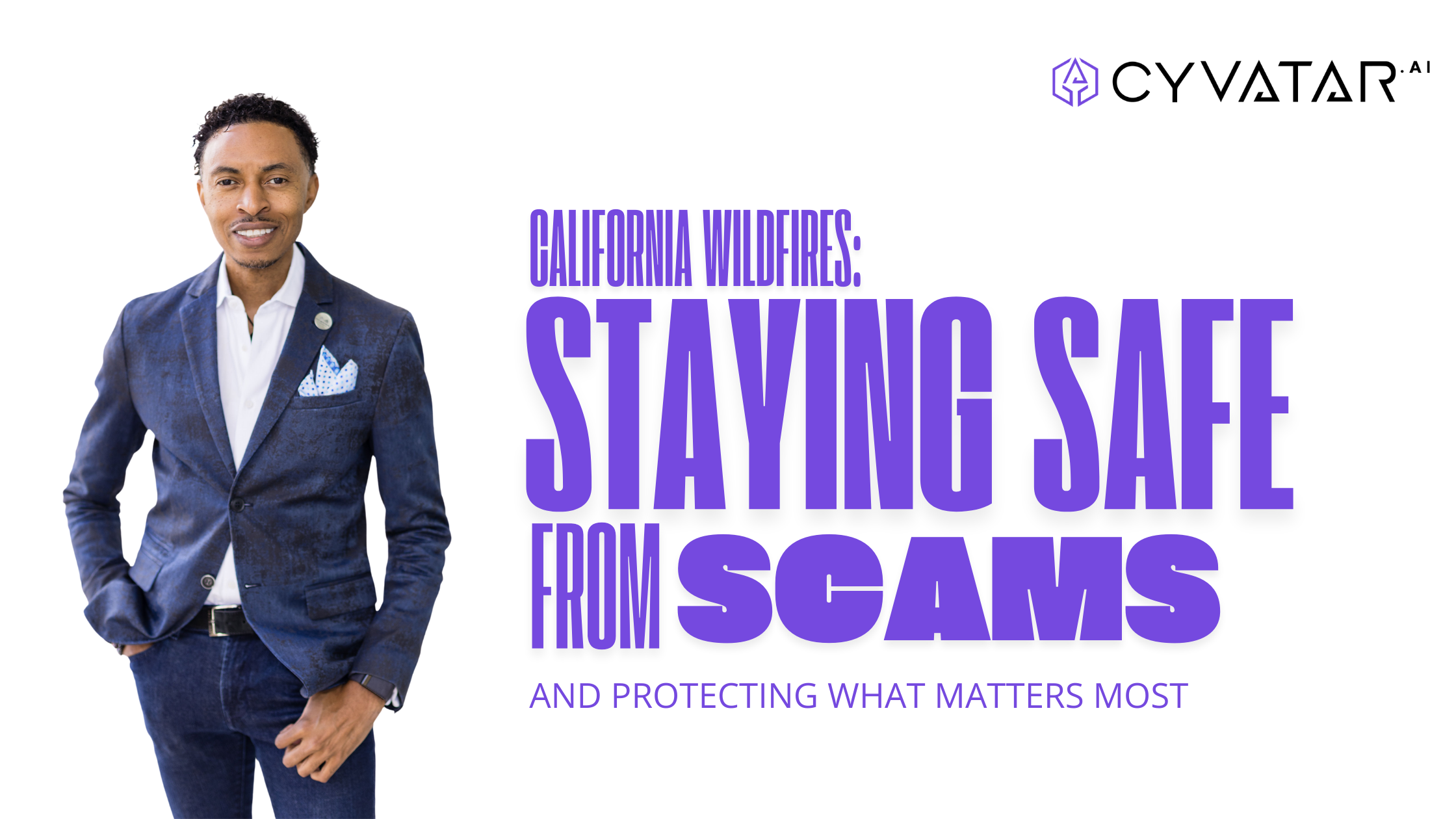California Wildfires: Staying Safe from Scams and Protecting What Matters Most

California Wildfires: Staying Safe from Scams and Protecting What Matters Most
Courtney Pereira | 01/22/2025Wildfires are devastating. They tear through homes, businesses, and entire communities, leaving people displaced and scrambling to rebuild their lives. But amidst the chaos and loss, another threat emerges—scammers looking to prey on the vulnerable.
At Cyvatar, we know that security is about more than just firewalls and passwords—it’s about protecting people from threats of all kinds, especially when they’re at their most vulnerable. Disasters bring out the best in our communities, but they also bring out opportunistic criminals who see these crises as a way to exploit people in need.
Scammers don’t just operate online—they’re showing up at people’s homes, targeting victims over the phone, and even pretending to be legitimate businesses, relief organizations, and government agencies. Whether you’re a wildfire survivor, a good Samaritan looking to donate, or a business navigating post-disaster recovery, here’s what you need to know to stay safe from scams.
The Rising Threat of Wildfire-Related Scams
Disasters create urgent needs for shelter, financial aid, and rebuilding services—which makes them the perfect hunting ground for scammers. Officials in California have already reported an increase in price gouging, fraudulent contractors, fake charities, and impersonators posing as FEMA and insurance agents.
These scams don’t just affect wildfire survivors. If you’re donating, trying to help, or even just looking for information, you could be targeted too. Here are some of the most common wildfire-related scams:
🔥 1. Price Gouging
After an emergency is declared, businesses cannot legally raise prices by more than 10% on essential goods and services like:
- Hotels and rental properties
- Construction materials
- Storage units
- Emergency supplies
Yet, reports are already surfacing about hotels, landlords, and even supply stores illegally hiking up prices in affected areas.
✅ How to Protect Yourself:
- Compare prices before committing to a purchase.
- If a price seems too high, check what it was before the disaster—a sudden jump could mean price gouging.
- Report any suspected gouging to local authorities or the California Attorney General’s Office.
🏚 2. Fake Contractors and Repair Scams
After a disaster, many homeowners face urgent repair needs. Scammers posing as contractors go door-to-door, offering quick repairs—for an upfront fee. They may even claim they’re approved by FEMA or your insurance company. Once they get paid, they disappear.
✅ How to Protect Yourself:
- Verify licenses with the California Contractors State License Board (CSLB) (www.cslb.ca.gov).
- Never pay the full amount upfront—legitimate contractors don’t demand full prepayment.
- Get everything in writing, including contracts and cost estimates.
- Be skeptical of “too good to be true” deals—rushed work often means shoddy or unfinished projects.
❤️ 3. Fake Charities and Fraudulent Donation Drives
In the wake of disasters, scammers set up fake charities to take advantage of people’s goodwill. These scammers create fake websites, misleading social media fundraisers, and fraudulent crowdfunding pages that appear legitimate.
✅ How to Protect Yourself:
- Verify charities through Charity Navigator (www.charitynavigator.org).
- Be cautious of unsolicited donation requests, especially those using emotional stories to pressure you.
- Avoid donating via gift cards, wire transfers, or cryptocurrency—these are often untraceable scams.
📞 4. Government and Insurance Impersonators
Scammers posing as FEMA officials, insurance agents, or government relief workers are making phone calls and home visits, claiming they can speed up aid for a fee. They may also ask for personal information, putting you at risk for identity theft.
✅ How to Protect Yourself:
- FEMA does not charge fees for disaster relief. If someone asks for money, it’s a scam.
- If you receive a phone call, don’t give out personal information—instead, contact FEMA or your insurance provider directly to confirm the request.
- Ask for identification—legitimate FEMA agents and relief workers will have official ID badges.
💻 5. Cyber Threats & Phishing Scams
Cybercriminals are using fake emails, texts, and social media messages to trick wildfire victims into clicking malicious links. These scams claim to offer relief funds, aid applications, or urgent safety updates, but in reality, they’re designed to steal personal data or install malware.
✅ How to Protect Yourself:
- Be cautious of links in emails and texts. If you’re unsure, visit the organization’s website directly.
- Check email addresses carefully—scammers often use fake domains that look real at first glance.
- If someone pressures you to act immediately, it’s a red flag.
How Cyvatar Helps Protect You and Your Business
At Cyvatar, we don’t just protect businesses from cyber threats—we help organizations, individuals, and communities stay secure from all types of fraud and scams.
✔️ Cybersecurity Awareness Training – Teaching individuals and businesses how to spot scams, phishing attempts, and fraud.
✔️ Email Security Management – Preventing phishing and scam emails from ever reaching your inbox.
✔️ DNS Security Management – Blocking access to malicious websites linked to wildfire scams.
✔️ Threat & Vulnerability Management – Helping businesses stay one step ahead of cybercriminals.
The reality is that scammers evolve—but so do we. Our team is dedicated to stopping threats before they reach you, your family, or your business.
What to Do If You’re Targeted
If you suspect you’ve encountered a scam, don’t stay silent—report it. Law enforcement agencies are actively investigating wildfire-related fraud and working to hold scammers accountable.
📌 Report scams to:
🔹 Price Gouging – California Attorney General’s Office
🔹 Fake Contractors – California Contractors State License Board
🔹 Charity Scams – Federal Trade Commission (FTC)
🔹 FEMA Impersonators – FEMA Disaster Fraud Hotline (866) 720-5721
Together, We Stay Safe
The strength of California isn’t just in its landscapes—it’s in its people. Wildfires test our resilience, but they also remind us of the power of community.
By staying informed, watching out for one another, and taking proactive security measures, we can stop scammers in their tracks and ensure that support goes to those who truly need it.
At Cyvatar, we’re here to help—whether it’s through cybersecurity protection, scam awareness, or just offering the right tools to keep you and your business safe.
